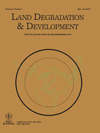
LAND DEGRADATION & DEVELOPMENT
Scope & Guideline
Bridging the gap between science and sustainable development.
Introduction
Aims and Scopes
- Land Degradation Assessment:
Research on the causes, processes, and impacts of land degradation, including soil erosion, salinization, and desertification, using various methods such as remote sensing, soil sampling, and ecological modeling. - Ecosystem Restoration and Rehabilitation:
Studies focusing on techniques and strategies for restoring degraded lands, including afforestation, reforestation, and the use of biochar and other organic amendments to enhance soil health and ecosystem functions. - Soil Health and Management Practices:
Investigations into soil quality indicators, nutrient cycling, and the effectiveness of various agricultural practices (e.g., no-till farming, cover cropping) on maintaining or improving soil health. - Impact of Climate Change on Land Systems:
Research exploring the interactions between climate change and land use, including the effects of changing precipitation patterns and temperature on soil properties, vegetation dynamics, and land degradation. - Biodiversity and Ecosystem Services:
Exploration of the relationships between land use, biodiversity, and ecosystem services, focusing on how land management practices influence ecological functions and services.
Trending and Emerging
- Microbial Ecology and Soil Health:
An increasing number of studies focus on the role of soil microbial communities in enhancing soil health, nutrient cycling, and ecosystem resilience, emphasizing the importance of biological indicators. - Climate-Smart Agriculture:
Research is trending towards climate-smart agricultural practices that enhance resilience to climate change while maintaining productivity, including studies on water management and soil conservation techniques. - Land Use Change and Ecosystem Services:
There is a growing emphasis on understanding how land use changes affect ecosystem services, with a focus on quantifying trade-offs and synergies between agricultural productivity and ecological health. - Integrated Land Management Approaches:
Emerging studies highlight the integration of various land management strategies, including agroforestry, conservation agriculture, and landscape ecology, to achieve sustainable land use and minimize degradation. - Impact of Microplastics on Soil Health:
Increasing concerns about microplastic pollution have led to a rise in research examining its effects on soil properties, microbial communities, and overall ecosystem functioning.
Declining or Waning
- Traditional Agricultural Practices:
Research on conventional agricultural practices, such as extensive tillage and heavy chemical fertilizer use, has declined as the focus shifts towards sustainable and organic farming methods. - Single-Crop Systems:
There is a waning interest in studies focusing solely on single-crop systems, as integrated and diversified cropping systems gain more attention for their benefits in enhancing soil health and resilience. - Historical Land Use Studies:
While historical analyses of land use changes remain relevant, there is less emphasis on purely retrospective studies, with a growing preference for current and predictive modeling approaches. - Urban Land Use Impacts:
Research specifically addressing urban land use and its direct impacts on soil health and ecosystems appears to be decreasing, possibly overshadowed by broader agroecological and rural land management studies.
Similar Journals
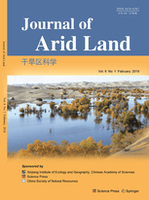
Journal of Arid Land
Bridging research and practice in water science and policy.Journal of Arid Land, published by SPRINGER HEIDELBERG, is a pivotal platform dedicated to advancing knowledge in the fields of Earth-Surface Processes, Management, Monitoring, Policy and Law, and Water Science and Technology. With an ISSN of 1674-6767 and an E-ISSN of 2194-7783, this journal stands out as a prominent source of scholarly research focusing on the unique challenges and opportunities of arid and semi-arid environments, particularly relevant in the context of global climate change. As of 2023, it holds a commendable Q2 ranking in several critical categories, underscoring its impact in environmental science and related disciplines. The journal, which has been in publication since 2009 and is set to continue through 2024, provides unrestricted access to high-quality research that sheds light on sustainable practices and effective policies. With its focus on arid lands, the Journal of Arid Land plays an essential role in fostering interdisciplinary dialogue among researchers, practitioners, and policymakers striving to address the pressing issues faced by these ecosystems.
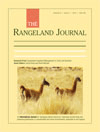
RANGELAND JOURNAL
Unveiling Insights into Rangeland EcologyRangeland Journal, published by CSIRO PUBLISHING, stands as a pivotal resource within the fields of ecology and environmental science. With an ISSN of 1036-9872 and an E-ISSN of 1834-7541, this journal has been disseminating critical research findings from 1998 to 2024, particularly focusing on the intricate dynamics of rangelands and their ecological significance. The journal is recognized for its contributions to the Q3 category in both Ecology and Ecology, Evolution, Behavior and Systematics, demonstrating its relevance in advancing scholarly discourse among researchers and professionals alike. Furthermore, with Scopus ranking it in the 57th percentile within its respective categories, the Rangeland Journal serves as an essential platform for fostering academic exchange and promoting sustainable management practices in rangeland environments. While currently not an open-access publication, it remains a vital institution for those dedicated to the stewardship and study of these unique landscapes.

Land is a premier open-access journal published by MDPI since 2012, dedicated to the interdisciplinary study of land use, management, and conservation. Based in Switzerland, this journal has rapidly established itself as a vital resource in the field, achieving impressive rankings in its categories: Q1 in Ecology and Nature and Landscape Conservation, and Q3 in Global and Planetary Change, reflecting its high impact in relevant scientific discourse. With an E-ISSN of 2073-445X, Land not only contributes to the advancement of knowledge but also fosters international collaboration among researchers, practitioners, and policymakers. The journal publishes high-quality peer-reviewed articles, offering a platform for innovative research and timely discussions surrounding land issues, ensuring accessibility and visibility through its open-access model. As it continues to converge from 2012 to 2024, Land is poised to play an influential role in shaping sustainable land practices and informing global environmental policies.
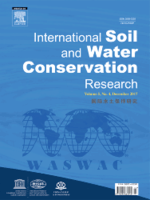
International Soil and Water Conservation Research
Innovating practices to safeguard our soil and water resources.International Soil and Water Conservation Research is a premier, peer-reviewed academic journal dedicated to advancing the field of soil and water conservation. Published by KEAI PUBLISHING LTD in China, this Open Access journal has established itself as a vital resource since its inception in 2013, offering researchers and practitioners an unparalleled platform for sharing innovative research and methodologies. With its impressive impact factor and recognition as a Q1 category journal in Agronomy, Water Science, Nature and Landscape Conservation, and Soil Science, it ranks among the top journals in its field, as evidenced by its high Scopus ranks—with ranks such as #10 in Soil Science and #12 in Nature and Landscape Conservation. The journal is committed to not only enhancing the scientific community's understanding of conservation practices but also addressing global challenges related to sustainable land and water resource management. By fostering interdisciplinary collaboration, International Soil and Water Conservation Research serves as an essential reference point for scholars, professionals, and students aiming to contribute to sustainable practices and policies in the context of agriculture and environmental management.

Frontiers in Soil Science
Bridging research and practice in soil health.Frontiers in Soil Science, published by FRONTIERS MEDIA SA in Switzerland, is an esteemed open-access journal dedicated to advancing our understanding of soil systems and their vital role in ecosystem functioning and sustainable agricultural practices. Since its inception in 2021, this journal has quickly established itself within the scientific community, boasting a 2023 Scopus Q2 ranking in Soil Science and a notable percentile of 41 among its peers. Researchers and practitioners in the field will find a wide array of original research, reviews, and contributions that address key topics such as soil health, carbon sequestration, and nutrient cycling. With a commitment to fostering collaboration and dissemination of knowledge, Frontiers in Soil Science serves as a vital resource for professionals, researchers, and students who aspire to innovate and lead in soil science research.

REVISTA BRASILEIRA DE CIENCIA DO SOLO
Advancing Soil Science for a Sustainable FutureREVISTA BRASILEIRA DE CIENCIA DO SOLO, published by the SOC BRASILEIRA DE CIENCIA DO SOLO, serves as a vital open-access platform for disseminating impactful research in the fields of Agronomy and Soil Science. With an ISSN of 0100-0683 and an E-ISSN of 1806-9657, this journal has been fostering academic dialogue since 2003 and has gained recognition as a Q2 journal in both Agronomy and Soil Science as of 2023. Based in Brazil and actively supporting scientists and practitioners globally, it is uniquely positioned to address the challenges and innovations in soil management and cultivation practices. The journal's Scopus rankings reflect its commitment to quality, standing at #164/406 in Agronomy and Crop Science and #74/159 in Soil Science, placing it in the top quartile of its category. Researchers, professionals, and students are encouraged to contribute their findings and insights, making it a significant resource for anyone interested in advancing the science of soil and crop stewardship.
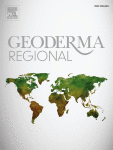
Geoderma Regional
Exploring the complexities of soil management.Geoderma Regional is a premier scholarly journal dedicated to advancing the field of Soil Science. Published by Elsevier in the Netherlands, this journal serves as a vital platform for disseminating high-quality, peer-reviewed research that spans the complexities of soil management, behavior, and the implications of soil processes on environmental sustainability. Since its inception in 2014, Geoderma Regional has achieved an impressive position within the academic community, holding a Q1 ranking in the field of Soil Science, placing it among the top 20% of journals in its category according to SCOPUS rankings. This journal is particularly distinguished for its significant contributions to the nexus between agriculture and biological sciences, reflected in its rank of #33 out of 159 in this field with a commendable 79th percentile. Researchers, professionals, and students alike will appreciate the journal's commitment to open discourse and innovative research agendas as it aspires to enhance our understanding of soil dynamics, addressing critical issues facing our planet.
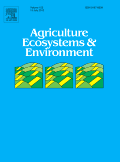
AGRICULTURE ECOSYSTEMS & ENVIRONMENT
Pioneering Insights in Ecosystem Management and AgronomyAGRICULTURE ECOSYSTEMS & ENVIRONMENT is a premier journal published by Elsevier, specializing in the fields of agronomy, animal science, and ecology. With an impressive impact factor reflective of its stature, it ranks in the top quartile (Q1) across three significant categories, highlighting its critical role in advancing research within the agricultural and environmental sciences. The journal serves as a vital platform for disseminating high-quality research that addresses the complex interactions between agriculture and ecosystems, providing insightful methodologies and findings that inform sustainable practices. As the journal continues to converge from 1983 and through to 2025, it remains committed to offering both traditional and innovative access options while contributing to the academic community's understanding of pressing environmental challenges. Researchers, professionals, and students are encouraged to engage with the journal's comprehensive content, which is positioned among the elite in its fields, having achieved top rankings in Scopus across relevant disciplines.
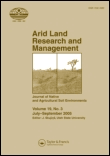
ARID LAND RESEARCH AND MANAGEMENT
Advancing knowledge for resilient arid environments.ARID LAND RESEARCH AND MANAGEMENT is a leading journal in the field of Soil Science, published by Taylor & Francis Inc in the United Kingdom. With a focus on the sustainable management of arid and semi-arid lands, this journal aims to bridge the gap between scientific research and practical application. It garners a respectable impact factor, categorically positioned in the Q2 quartile within its field and ranks 59th out of 159 in Scopus, representing the top 63rd percentile of journals in Agricultural and Biological Sciences - Soil Science. As an essential resource for researchers, practitioners, and students alike, ARID LAND RESEARCH AND MANAGEMENT publishes high-quality, peer-reviewed articles that cover a wide range of topics, from soil conservation techniques to innovative land management practices. Open access options are available, facilitating broader dissemination of knowledge critical to addressing global challenges associated with arid environments. Targeting a pivotal area of study, this journal plays a significant role in advancing the understanding and management of these unique ecosystems, making it a valuable asset for anyone engaged in environmental sustainability.

Carpathian Journal of Earth and Environmental Sciences
Bridging Disciplines for Environmental SolutionsCarpathian Journal of Earth and Environmental Sciences is a distinguished academic journal dedicated to advancing the interdisciplinary field of Earth and environmental sciences. Published by the Carpathian Association for Environment and Earth Sciences, this journal plays a pivotal role in disseminating high-quality research focused on the dynamic interactions between geological processes and environmental changes. With an ISSN of 1842-4090 and an E-ISSN of 1844-489X, the journal is indexed in Scopus and holds an esteemed Q3 quartile ranking in both Earth and Planetary Sciences and Environmental Science categories as of 2023. Since its inception in 2008, the Carpathian Journal has provided an open access platform for researchers, professionals, and students to share insights, foster collaboration, and engage in critical discussions on pressing environmental issues. By continuously contributing to the body of knowledge in this field, the journal not only enhances academic discourse but also promotes sustainable environmental practices across Romania and beyond.